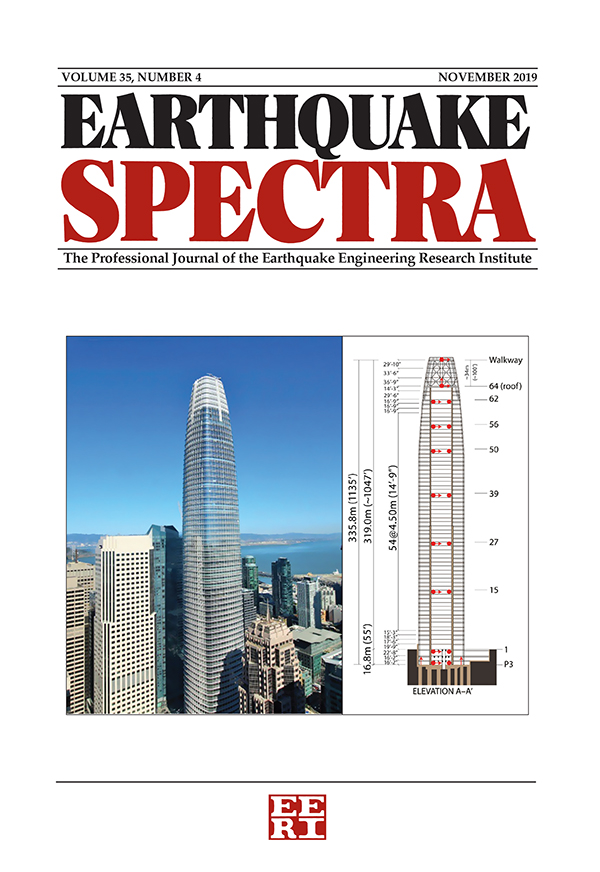2023 年土耳其地震序列对哈塔伊和奥斯曼尼耶纪念性砖石建筑造成的破坏:墙体几何形状、建筑质量和材料特性的作用
IF 3.7
2区 工程技术
Q2 ENGINEERING, CIVIL
引用次数: 0
摘要
本文报告了 2023 年土耳其地震发生后对哈塔伊市和奥斯曼尼耶市 29 幢历史悠久的石砌建筑进行调查的结果。2 月 6 日发生的地震(震级为 7.8 级和 7.5 级)和随后发生的地震(包括 2 月 20 日发生的另一场地震,震级为 6.3 级)对建筑物造成了严重损坏。为了解原因,对受检建筑物进行了 EMS-98 破坏等级(从 1 到 5 不等)和描述性响应类别(砌体分解、局部机制和整体响应)。总体破坏统计表明,砌体离析是普遍现象,并且与局部机制反应同出一辙。随后对墙体几何和施工质量指数进行了调查,以探究这些成为主要破坏机制的原因。墙体几何指数表明,墙体的数量不足以抵抗当地的地震要求,特别是在建筑物的横向(如短距离)。这种不足促进了局部机制的形成。施工质量指标表明,石材布局无法实现互锁,墙体容易发生离析。为了进一步研究材料特性对所观察到的损坏所起的作用,使用了三种无损检测技术对材料进行鉴定:超声波脉冲速度(UPV)测量以估算石材的静态弹性模量,施密特回弹锤(SRH)测试以估算石材的抗压强度,砂浆渗透仪(MP)测试以估算砂浆的抗压强度。测量结果表明,砂浆质量差,可能加速了故障的发生。利用已建立的相关关系,可以得出其他各种重要的材料参数(如砂浆内聚力和均匀砌体强度)。预计本文中的破坏观测和材料测量结果将为地震期间历史性砌体建筑行为的详细建模工作提供参考。本文章由计算机程序翻译,如有差异,请以英文原文为准。
Damage to monumental masonry buildings in Hatay and Osmaniye following the 2023 Turkey earthquake sequence: The role of wall geometry, construction quality, and material properties
This article reports on the findings of an investigation on 29 historic stone masonry buildings located in the cities of Hatay and Osmaniye following the 2023 Turkey earthquake sequence. The earthquake couplet on 6 February (with moment magnitudes 7.8 and 7.5) and the following events (including another earthquake which occurred on 20 February with a moment magnitude of 6.3) resulted in significant damage to the buildings. To understand why, the examined buildings were assigned an EMS-98 damage level (ranging from 1 to 5) and descriptive response categories (masonry disaggregation, local mechanism, and global response). Overall damage statistics indicated that masonry disaggregation was common and coterminous with local mechanism response. Wall geometry and construction quality indices were then investigated to explore why these were the dominant damage mechanisms. Wall geometry indices highlighted insufficient amount of walls to resist the local seismic demands, particularly in the transverse (e.g. short) direction of buildings. This deficit promoted the formation of local mechanisms. Construction quality indices suggested that stone layouts did not enable interlocking and that the walls were prone to disaggregation. To further investigate the role of material properties on the observed damage, materials were characterized using three non-destructive testing techniques: ultrasonic pulse velocity (UPV) measurements to estimate the static elastic modulus of stones, Schmidt rebound hammer (SRH) tests to estimate the compressive strength of stones, and the mortar penetrometer (MP) tests to estimate the compressive strength of mortar. The measurements indicated poor mortar quality, which may have expedited failures. Using established correlations, various other important material parameters (e.g. mortar cohesion and homogenized masonry strength) are derived. It is envisioned that the damage observations and the material measurements in this article will inform detailed modeling efforts on the behavior of historic masonry buildings during the earthquakes.
求助全文
通过发布文献求助,成功后即可免费获取论文全文。
去求助
来源期刊

Earthquake Spectra
工程技术-工程:地质
CiteScore
8.40
自引率
12.00%
发文量
88
审稿时长
6-12 weeks
期刊介绍:
Earthquake Spectra, the professional peer-reviewed journal of the Earthquake Engineering Research Institute (EERI), serves as the publication of record for the development of earthquake engineering practice, earthquake codes and regulations, earthquake public policy, and earthquake investigation reports. The journal is published quarterly in both printed and online editions in February, May, August, and November, with additional special edition issues.
EERI established Earthquake Spectra with the purpose of improving the practice of earthquake hazards mitigation, preparedness, and recovery — serving the informational needs of the diverse professionals engaged in earthquake risk reduction: civil, geotechnical, mechanical, and structural engineers; geologists, seismologists, and other earth scientists; architects and city planners; public officials; social scientists; and researchers.
 求助内容:
求助内容: 应助结果提醒方式:
应助结果提醒方式:


